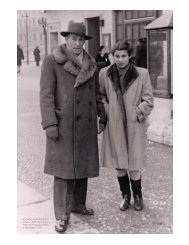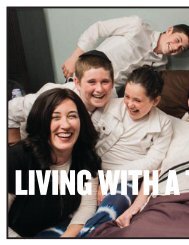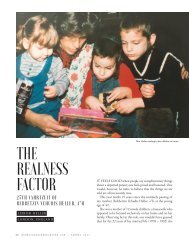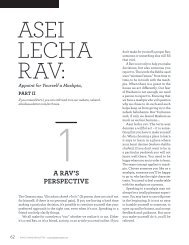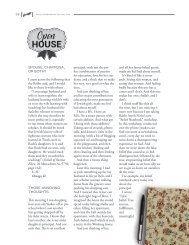Dementia.pdf
Dementia, by Rachel Spangenthal
Dementia, by Rachel Spangenthal
Create successful ePaper yourself
Turn your PDF publications into a flip-book with our unique Google optimized e-Paper software.
ith approximately half of people over 85 facing<br />
some form of dementia, it behooves all of<br />
us to educate ourselves about it. In this special<br />
supplement, N’shei Chabad Newsletter presents<br />
insights, tools and stories on living with<br />
dementia. If you have found something that<br />
worked in helping yourself or a loved one with<br />
dementia, please write to us about it. We will<br />
be happy to share with our readers – Editors<br />
44 n’shei Chabad newsletter | nsheichabadnewsletter.com
Sometimes things just don’t go<br />
as I had hoped. At the end of<br />
a day like that, I fall into bed<br />
hoping that tomorrow will be<br />
a brighter day.<br />
But for my grandfather – the happiest<br />
human being that I have had the privilege<br />
to meet – life is different.<br />
He always smiles when I visit him. He<br />
gives me a surprised, “Hello, Rebecca! I<br />
haven’t seen you in a while!” and reciprocates<br />
my hug.<br />
“No, Grandpa Eli, it’s Rachel.”<br />
I sit down. Our eyes meet. He laughs.<br />
“Where are you in life now?” he asks.<br />
I give some response and he invariably<br />
replies, “That’s lovely.”<br />
in life now?” For my grandfather, every<br />
moment is created anew. It is tied neither<br />
to the last minute nor the moment following.<br />
He lives in an everlasting present<br />
– surrounded by the potential to begin<br />
afresh – and is delighted there.<br />
We are taught that G-d speaks the<br />
world into being at every moment. Our<br />
lives, though they may seem to run<br />
independently of external forces, are<br />
nothing but a constant pulsating flow<br />
of G-dly energy. In a similar manner, a<br />
ball thrown into the air appears to rise<br />
of its own accord. Physics, however, dictates<br />
that the ball is only enabled to rise<br />
as long as the force from one’s hand<br />
continues driving it upward. As soon as<br />
My Grandfather:<br />
Living Only in the Present Rachel Spangenthal<br />
The conversation continues. His tone<br />
rises and falls. My focus is again drawn<br />
to the mosaic of veins and bruises upon<br />
his skin when he asks, “So, where are<br />
you in life now?”<br />
I repeat what I have just said and<br />
offer to take him for a drive. An offer he<br />
gladly accepts.<br />
We get in the car. His head tilts in<br />
curiosity and he says,<br />
“Rebecca, it has been so long! Where<br />
are you in life now?”<br />
I stop telling him I am not Rebecca,<br />
and tell him where I am in life now. He is<br />
delighted with my reply and gazes at the<br />
passing scenery.<br />
“The day is perfect, isn’t it? The<br />
weather is beautiful. Look at the sky!”<br />
“Yes, Grandpa, it is. It is perfect.”<br />
The day is cloudy. He only sees<br />
sunshine.<br />
He places his hand gently on mine. His<br />
eyes light up as a question occurs to him.<br />
“So, my darling, tell me – where are you<br />
that force is exhausted, the ball falls to<br />
the ground. So, too, an ebb and flow of<br />
Divine light creates and recreates the<br />
world numerous times per second. We<br />
don’t see it, but perhaps my grandfather<br />
does.<br />
Perhaps my grandfather is not, as the<br />
rest of the world tells me, “losing it.” Perhaps<br />
he is just more in tune with the<br />
reality of the world. A reality in which<br />
what matters is not from where you have<br />
come, but the endless potential in this<br />
very moment.<br />
My grandfather exists in a world<br />
where one is never stuck in the mire<br />
of the situation; one need not wait for<br />
tomorrow to have a better day. Rather,<br />
from one second to the next, one can<br />
take a deep breath and begin again.<br />
From my grandfather, I have learned<br />
that although life may become extremely<br />
challenging, I can always close my eyes,<br />
smile, and ask myself, “So, where are you<br />
in life now?” •<br />
February 2013 45
Help, Information and Support for Families of People With <strong>Dementia</strong><br />
The following information was compiled<br />
from interviews with medical professionals,<br />
and books and websites on the<br />
topics of dementia and Alzheimer’s<br />
Disease.<br />
WHAT IS DEMENTIA, AND HOW DOES IT<br />
DIFFER FROM ALZHEIMER’S?<br />
People often mistakenly use the<br />
words dementia and Alzheimer’s<br />
interchangeably. The word dementia<br />
actually stems from the Latin<br />
word “demens,” meaning “out of the<br />
mind.” Unlike Alzheimer’s, dementia<br />
is not a disease but a description<br />
of a number of progressive symptoms.<br />
It is a general term ascribed<br />
to anyone whose mind is functioning<br />
at lower than normal levels to<br />
the point where one’s mind and<br />
behaviors are noticeably and negatively<br />
affected<br />
Although Alzheimer’s is the<br />
cause of approximately 60% of<br />
dementia cases, there are many<br />
other causes. In other words, those<br />
with Alzheimer’s always have<br />
dementia, but dementia patients do<br />
not always have Alzheimer’s.<br />
Contrary to what some people<br />
may think, dementia is not a less<br />
severe problem, with AD being a<br />
more severe problem. There is not<br />
a continuum with dementia on one<br />
side and AD at the extreme. Rather,<br />
there can be early or mild stages of<br />
AD, which then progress to moderate<br />
and severe stages of the disease.<br />
<strong>Dementia</strong> is like fever – a symptom.<br />
Every fever doesn’t prove<br />
infection, just as every case of<br />
dementia is not necessarily AD.<br />
WHEN WAS AD DISCOVERED AND WHY<br />
ARE THERE SO MANY MORE CASES NOW<br />
THAN THERE USED TO BE?<br />
Alzheimer’s was first discovered<br />
in 1907, but the disease was not<br />
well known until the late 1970’s.<br />
Since then, Alzheimer’s appears<br />
to affect a rising number of people<br />
every year. One reason for this<br />
is simply that the risk of developing<br />
Alzheimer’s increases as a person<br />
ages. People are now living longer<br />
than they used to. For example, in<br />
the past 100 years, life expectancy<br />
for a woman has increased from 53<br />
to 81. Together with the increasing<br />
life span comes a greater number of<br />
Alzheimer’s cases. Secondly, symptoms<br />
such as forgetfulness and<br />
loss of cognitive ability were, in the<br />
past, called “senility” and considered<br />
a natural part of aging. Thus,<br />
Alzheimer’s and other forms of<br />
dementia were rarely diagnosed.<br />
Since then, technological tests<br />
such as CT scans and MRIs have<br />
helped differentiate between normal<br />
aging and things like dementia and<br />
Alzheimer’s.<br />
WHAT IS ALZHEIMER’S DISEASE?<br />
Alzheimer’s Disease (AD) is a brain<br />
disorder that today’s population is,<br />
unfortunately, all too familiar with.<br />
It appears as a progression of symptoms<br />
that begin with a loss of ability<br />
to create and retain recent memories.<br />
A person in the beginning<br />
stages of Alzheimer’s has trouble<br />
remembering his zip code, where<br />
he put his keys or what day of the<br />
week it is. Because these indications<br />
often appear slowly, Alzheimer’s<br />
is frequently not noticed or diagnosed<br />
until five to ten years after<br />
symptoms begin. As the disease<br />
progresses, long-term memories<br />
such as names of loved ones<br />
begin to decay. Eventually, one with<br />
Alzheimer’s exhibits a loss of orientation<br />
to person, place and time. In<br />
addition to memory loss, those with<br />
Alzheimer’s may undergo changes<br />
in personality or social skills and<br />
have difficulty with language ability,<br />
perception, and cognition.<br />
WOULD MUSIC BE HELPFUL TO MY RELA-<br />
TIVE WITH DEMENTIA?<br />
According to writer and researcher<br />
Allison Takeda and author Michael<br />
Krauthamer [see Recommended<br />
Reading, below], who has worked<br />
with Alzheimer’s patients with great<br />
success for several decades and in<br />
several different venues, music is a<br />
powerful catalyst for healing and<br />
unlocking memories in patients previously<br />
thought lost to dementia.<br />
One study out of France found that<br />
it reduces symptoms of anxiety and<br />
depression in people with Alzheimer’s,<br />
and other research suggests<br />
that it facilitates cognitive function<br />
and triggers associations with events<br />
or emotions from the past.“There’s<br />
something about music that cuts<br />
through right up until the very end of<br />
the disease,” Geri Hall, a clinical nurse<br />
specialist at the Banner Alzheimer’s<br />
Institute in Phoenix, told ABC News.<br />
“It calms them, it increases socialization,<br />
and it decreases the need<br />
for mood-controlling medications.”<br />
46 n’shei Chabad newsletter | nsheichabadnewsletter.com
Michael Krauthamer advises families<br />
of those with AD, “Please play<br />
some favorite music from his past<br />
and see if you can make a connection.<br />
Music can be extremely<br />
powerful with dementia patients.”<br />
Some families have found that<br />
hearing the tunes sung live by loved<br />
ones is even better than hearing<br />
them from the original artists. Very<br />
simply, hearing the right niggunim<br />
or songs can make sad people<br />
happy, even bring “sleeping” people<br />
“to life,” without side effects.<br />
WHAT CAN BE DONE FOR PEOPLE WITH<br />
THESE DISEASES, THEIR FAMILIES, AND<br />
THEIR CAREGIVERS?<br />
Pharmaceutical research has produced<br />
a few drugs that purportedly<br />
help stave off symptoms of AD, but<br />
are still unable to stop the progression<br />
of the disease. These drugs may<br />
or may not provide some symptomatic<br />
relief for patients by helping<br />
improve mental functions such as<br />
memory, attention and language<br />
abilities, but they often cause negative<br />
side effects.<br />
In some cases, the drug itself causes<br />
the very problems it is supposed to<br />
ameliorate. Here is a partial list of side<br />
effects from some common Alzheimer’s<br />
drugs that were approved for<br />
use in elderly people with dementia:<br />
poor vision; loss of balance; dizziness;<br />
falls; incontinence; nervousness;<br />
agitation; increased confusion;<br />
insomnia; depression; abnormal<br />
dreams; delusions; irritability;<br />
aggression; restlessness; abnormal<br />
crying; hostility; emotional<br />
withdrawal.<br />
In addition to memory loss,<br />
Alzheimer’s patients commonly suffer<br />
from anxiety, depression, and<br />
agitation. A person who cares for a<br />
relative with Alzheimer’s or dementia<br />
can assist the patient with a<br />
comprehensive approach of good<br />
medical care, mental stimulation,<br />
and warmth. Studies have shown<br />
that AD patients with female caregivers<br />
show greater life satisfaction<br />
than patients with male caregivers.<br />
This could be because women have<br />
a natural motherly instinct and<br />
treat the person who has dementia<br />
with an extra dose of patience, love<br />
and concern.<br />
Caring for a loved one whose<br />
own mind is playing tricks on him<br />
is an emotionally demanding task<br />
and a physically demanding one as<br />
well. As vital as it is to remember to<br />
treat the patient with care, it is also<br />
imperative for extended family and<br />
friends to act towards caregivers<br />
with kindness and respect. Caregivers,<br />
especially the unpaid variety,<br />
need our moral support and respect.<br />
Most of all, they need our help, our<br />
visits, and the chance to regularly<br />
take time off.<br />
WHERE CAN FRUM PEOPLE GO FOR<br />
ADVICE AND SUPPORT IN CARING FOR A<br />
RELATIVE WITH AD?<br />
The frum communities in Brooklyn,<br />
New York, are blessed with the<br />
hard work and expertise of a woman<br />
named Muriel Mehlman. Calmly,<br />
lovingly, and expertly, Muriel Mehlman,<br />
MSW, leads effective support<br />
groups in Boro Park, Williamsburg,<br />
and Flatbush for people who are caring<br />
for incapacitated relatives. As<br />
one woman said on her way out,<br />
“This meeting is a lifesaver. When<br />
I come here, I don’t feel like beating<br />
up my mother when I get home. I<br />
get strength and I remember that it’s<br />
not his fault.”<br />
Muriel Mehlman told the N’shei<br />
Chabad Newsletter, “For many the<br />
responsibility of caregiving is overwhelming.<br />
The women find<br />
themselves angry, frustrated,<br />
resentful, depressed, lonely and<br />
alone. Our support groups provide<br />
a safe haven where they can vent<br />
and discuss problems with others<br />
who are living in similar situations.<br />
I have been given this opportunity<br />
to help these caregivers help themselves.<br />
Our support groups are titled<br />
‘A Time to Share, a Way to Cope’<br />
because through group dynamics at<br />
our group sessions, the family members-turned-caregivers<br />
share their<br />
issues and help one another to cope<br />
in a healthy way.”<br />
For locations and times, and for<br />
any other questions, Muriel may<br />
be contacted at murielmehlman@<br />
yahoo.com or at 516.316.8890. No<br />
matter where you live, you can find<br />
the information and support you<br />
need. The Alzheimer’s Association<br />
can direct you to resources in your<br />
city. Call 1.800.272.3900 or visit alz.<br />
org. Be’ezras Hashem, may we merit<br />
only revealed good and the ultimate<br />
Redemption when all the sick will<br />
be healed.<br />
If you are caring for a loved one who<br />
is ill, don’t go it alone. Join a support<br />
group. If you live in Brooklyn, there are<br />
several support groups specifically for<br />
frum women, expertly facilitated by<br />
Muriel Mehlman [above]. Call her for<br />
details at 516.316.8890.<br />
February 2013 47
“At some point, I will no longer experience the pain of watching<br />
my mind deteriorate to a point of incomprehension. Then the<br />
loved ones around me will have the unwelcome task to look after<br />
me and shelter me from harm. My burden is slight compared to<br />
that of the truly living.”<br />
–Thomas Debaggio, in his book, “Losing My Mind: an Intimate Look at<br />
Life With alzheimer’s.”<br />
RECOMMENDED<br />
READING<br />
Some families of people with dementia have found<br />
the following three books especially helpful:<br />
Mr. Ely Hyman of Charlotte, North Carolina<br />
(Rachel Spangenthal’s grandfather)<br />
STILL ALICE BY LISA GENOVA<br />
This unusual book is written from the point of view<br />
of the actual person with Alzheimer’s, not by relatives,<br />
caregivers or doctors, and it gives the reader a<br />
whole new perspective – the patient’s. As the author,<br />
Lisa Genova, writes about Still Alice, “[One of my favorite<br />
scenes from the book] is a small scene with Alice [age<br />
50, with early onset Alzheimer’s] and her three [adult]<br />
children. The kids are all arguing over whether their<br />
mother should be trying to remember something or not.<br />
Alice asks what time they’ll be going to a play the next<br />
day. Her son tells her not to worry about it, she doesn’t<br />
need [to struggle] to remember something she doesn’t<br />
have to because they’re not going to go without her.<br />
Her oldest daughter thinks she should be exercising her<br />
memory whenever possible, the ‘use it or lose it’ philosophy.<br />
The youngest thinks they should just let their<br />
mom know the information, and she can do with it what<br />
she wants. This is pretty common in families where<br />
someone has Alzheimer’s. There’s disagreement and<br />
people dig in their heels and take things personally. It’s<br />
rife with conflict. In this scene, they argue and hurt one<br />
another’s feelings and never agree, all in front of Alice.<br />
People talk about people with Alzheimer’s all the time<br />
right in front of them, as if they’re not there.”<br />
THE 36-HOUR DAY BY NANCY MACE AND<br />
PETER RABINS<br />
This little book is packed with sympathetic and friendly<br />
advice, and the detailed sub-titles are very helpful in<br />
quickly finding exactly what you want.<br />
WALKING IN THEIR SHOES BY MICHAEL<br />
KRAUTHAMER<br />
Michael Krauthamer is a medical professional who has<br />
run Alzheimer’s wards. He is intimately familiar with<br />
the way his patients’ minds work, or don’t. His challenge<br />
is training the staff who work under him not to<br />
argue with the patients but to accept what they are saying<br />
since that is their reality at the moment. He utilizes<br />
the sociological model of healthcare (person-centered<br />
care) and Validation Therapy, which is a form of therapy<br />
discovered and developed by Naomi Feil. Through<br />
this he found that meaningful communication could be<br />
achieved with persons who were previously believed to<br />
be non-communicative, and negative behaviors could be<br />
redirected, diminished, or eliminated. The use of antipsychotic<br />
medicine and sedatives was also reduced or<br />
eliminated.<br />
If you are going to buy one book on this topic it should<br />
be Walking In Their Shoes by Michael Krauthamer.<br />
Excerpts from this book may be found on the following<br />
pages. Michael Krauthamer may be reached<br />
at walkingintheirshoes@gmail.com. His website<br />
is http://walking-in-their-shoes.com.<br />
48 n’shei Chabad newsletter | nsheichabadnewsletter.com
Michael<br />
Krauthamer<br />
Excerpted from the<br />
book with written permission<br />
of the author.<br />
WALKING IN<br />
THEIR SHOES<br />
HAROLD<br />
Harold, a frail, gray haired 94-year-old, was sitting<br />
in his wheelchair glaring at me as I proceeded down<br />
the hallway and into my new office. Due to his frail<br />
condition, Harold was at risk for falling; therefore,<br />
he had a pull-tab alarm connected to him and his<br />
wheelchair to notify staff if he tried to stand.<br />
One day, sitting in my office, I heard a loud commotion<br />
in the hallway as a high-pitched alarm<br />
blared. I immediately ran to the location, where I<br />
found Harold and a staff member in a heated argument,<br />
screaming over the blaring alarm. The staff<br />
member was yelling, “Sit down, Harold!” as Harold<br />
was yelling, “I don’t have to!” It was apparent<br />
that neither person was going to win the argument<br />
or stop yelling. Finally, a nurse arrived and intervened.<br />
In a calm voice, she changed the subject and<br />
persuaded Harold to sit down.<br />
At this point, it is important to discuss a major<br />
rule of communication. Never argue with a person<br />
who is diagnosed with Alzheimer’s disease. In addition<br />
to creating hostility, it can invoke many more<br />
emotions, from sadness and loneliness to confusion.<br />
Even if they cannot understand your words,<br />
they do understand your nonverbal communication<br />
and tone of voice. Sometimes they even mirror it.<br />
Therefore, it is important that as friends, family or<br />
healthcare providers, we monitor our own behavior<br />
such as mood, tone of voice, attitude, and mannerisms,<br />
especially with those who have lost verbal<br />
communication skills or speak in a nonsensical<br />
manner. Sometimes they no longer comprehend the<br />
spoken word, so it is imperative to enhance communication<br />
through nonverbal means.<br />
After reading Harold’s psychosocial history and<br />
learning more about him, I gained much insight<br />
into his previous life. He had been a very successful<br />
farmer, raising both crops and animals. Although<br />
Harold had lived in the facility for more than one<br />
year, it was quite clear that he still believed that<br />
he was living on his 950-acre farm. Nevertheless,<br />
whatever Harold believed was his truth, his reality,<br />
and nothing anyone said could change his mind.<br />
With the information obtained from his social<br />
history and a better understanding, I had a meeting<br />
with the staff and suggested that when Harold<br />
stood up, instead of yelling at him to sit down, they<br />
should walk over and ask in a calm voice, “Harold,<br />
where are you going?” After my request, a very long<br />
time passed before I would hear his alarm sound<br />
again. When it did, I looked up and sure enough, he<br />
was trying to stand. He was in such a fragile physical<br />
state that he couldn’t stand, let alone walk. My<br />
concern was that he would fall and hurt himself.<br />
As the alarm sounded, I ran to him in the hallway.<br />
In a calm voice, while making eye contact, I said,<br />
“Hey Harold, where ya goin’?”<br />
Harold’s stone-cold eyes glared into mine as he<br />
stated, “I am goin’ to feed my animals.”<br />
Trying to think fast, I said, “Harold, I just fed<br />
your animals.”<br />
With some confusion showing on his face, he<br />
said, “You did?”<br />
“Yes, Harold, I just walked back in. It sure is cold<br />
out there.”<br />
With that statement, he slowly sat back down as<br />
the alarm stopped sounding. Wow, my first experience<br />
with validation therapy and it worked! Harold<br />
February 2013 49
was happy that his animals had been fed and I was<br />
happy that he was sitting down.<br />
…One day, while walking down the hallway,<br />
I heard someone yelling and cursing inside his<br />
room. As I knocked on the door and entered, Harold<br />
was partially sitting up in his bed, leaning on<br />
his elbows and yelling, “Who told those [expletive<br />
deleted] they could drive on my property?” Harold<br />
was hearing and seeing the traffic on the street<br />
outside the window. His question<br />
caught me off guard<br />
and I blurted out, “Well, Harold,<br />
they put a road on your<br />
property.”<br />
Harold snapped back, “I<br />
didn’t give anybody permission<br />
to put a road on my<br />
property! Who did it? I hope<br />
they paid me good money to<br />
put a road there.”<br />
At that point, the only<br />
words that came to my mind<br />
were that it was the government<br />
and they had a lot of<br />
money and needed to put the<br />
road there so people could<br />
make it to the other side.<br />
With that explanation, Harold<br />
calmed down and resumed his nap. Validating that<br />
Harold owned the property and using a therapeutic<br />
fib stating that he was paid good money for the<br />
road was successful.<br />
Harold snapped<br />
back, “I didn’t<br />
give anybody<br />
permission to<br />
put a road on my<br />
property! Who<br />
did it?”<br />
JUANITA<br />
Juanita, a tall, stately, slender woman who walked<br />
with a cane and slight limp, had retired from nursing.<br />
This quiet yet dignified woman was diagnosed<br />
with Alzheimer’s disease combined with audiovisual<br />
hallucinations. Some days, she believed that<br />
she still worked as a nurse. Often in Juanita’s mind,<br />
her dog, Peppy, was by her side. Although Juanita<br />
was the only person who saw or heard Peppy, he<br />
was very real to her. He lived in her reality.<br />
One day, while working in my office, I overheard<br />
loud voices at the nurse’s station. Juanita, in<br />
an angry voice, yelled, “Peppy told me that you owe<br />
me $20 from that check I gave you!”<br />
Of course, no check had been written and no<br />
money was owed, but I listened further.<br />
“I don’t owe you any money and you didn’t give<br />
me a check!” the nurse shouted.<br />
“Yes, you do, Peppy was watching you and he<br />
doesn’t lie. You do owe me another $20!” Juanita said.<br />
At this time, a shouting match ensued and I<br />
overheard the nurse tell another staff member<br />
to go and find another nurse to assist her in giving<br />
Juanita a shot containing<br />
a prescribed medication only<br />
to be given if needed for medical<br />
reasons or, in this case, a<br />
“behavior.”<br />
When I heard the nurse<br />
instruct the staff member,<br />
I jumped up from my desk,<br />
grabbed a legal pad and immediately<br />
ran out of my office to<br />
find the nurse and resident continuing<br />
their heated argument.<br />
Politely, in a calm tone, I interrupted,<br />
“Miss Juanita, I heard<br />
that someone owes you some<br />
money and I am here to do an<br />
investigation. Can we sit over<br />
here so I can get some information?”<br />
Juanita looked at me with<br />
relief and said, “Yes, I would appreciate your help.”<br />
As we sat down, she continued, “Peppy said<br />
that woman behind the desk didn’t give me all my<br />
money and she still owes me $20.” Of course, there<br />
was no Peppy, but she believed that he was sitting<br />
beside her and she could see him. When she<br />
brought up Peppy, I said, “You know, I don’t know<br />
very much about dogs. What kind of dog is Peppy?”<br />
She was happy to reply that Peppy was a male<br />
poodle and that her mother and father had bred<br />
poodles when she was growing up. She continued<br />
telling me that she had always loved animals, but<br />
poodles were her favorite by far. At this point, Juanita<br />
had completely forgotten the argument over $20<br />
when two nurses approached her with a syringe.<br />
“Juanita, can you come in here so we can talk to<br />
you?” The nurses wanted her to go in the shower<br />
room so they could give her a powerful medication<br />
to reduce her “behavior.”<br />
50 n’shei Chabad newsletter | nsheichabadnewsletter.com
“What do you want to talk to me about?” asked<br />
Juanita.<br />
“You know... the money I owe you,” replied the<br />
nurse.<br />
Juanita did not need a shot at any point. She had<br />
forgotten the $20. But the nurses convinced her to go<br />
with them into the shower room. Without success, I<br />
strongly voiced my concerns to the nurses, trying to<br />
explain that the medication was no longer needed.<br />
The nurse proceeded with her plan. For the rest of<br />
the day, Juanita sat slumped over in a cloudy haze<br />
from the medication she had been given.<br />
Although it is sometimes a necessity, I do not<br />
believe in medicating persons for being confused,<br />
and always believe we should try to resolve the situation<br />
through verbal and nonverbal communication.<br />
In addition, at least three attempts should be made at<br />
communication before any medication is even considered.<br />
Sick people have the right to be free from<br />
physical and chemical restraints unless they are<br />
a danger to themselves or others. In this case, the<br />
nurse, a healthcare professional, had antagonized the<br />
resident to the point of great anger. This was unacceptable<br />
behavior by the nurse.<br />
MIRRORING<br />
…It is important that everyone with Alzheimer’s disease<br />
do as much for themselves as possible so they<br />
don’t forget. Therefore, if someone needs guidance<br />
but can still continue to get up and get dressed but<br />
only with assistance, it is important to gently guide<br />
them, by saying, for example, “Would you like to<br />
wear this, or this?” Depending on cognitive deficit,<br />
a general rule is to give no more than two choices.<br />
Many times, if someone doesn’t understand how to<br />
button their sweater, the staff or family member can<br />
button their own sweater and ask the person to mirror<br />
what they are doing, or if they cannot brush their<br />
hair, then a staff member can brush their own hair<br />
as the person holds a brush and ask them to do the<br />
same activity.<br />
Some people pick up these tasks quickly while<br />
others cannot. It is important to never force anyone<br />
to do anything they do not want to do. If you can see<br />
that the person simply cannot button their sweater<br />
or brush their hair, you should stop. If you continue<br />
to insist, you will create a problem situation.<br />
Michael Krauthamer at work.<br />
Maintaining the stage of activity is important but<br />
forcing someone to do something they can no longer<br />
remember how to do can create sadness, confusion<br />
and anger. Observing nonverbal communication is<br />
always important.<br />
DAVID<br />
David had moderate cognitive impairment, and a<br />
problem with his short-term memory. In fact, after<br />
he finished his meals, he would inevitably go to his<br />
room and return five minutes later and ask, “Is it<br />
time to eat?” David was fun-loving and always smiling<br />
and telling jokes until he felt someone was in<br />
trouble; then he would want to go to their defense.<br />
February 2013 51
Every day, David offered one or more residents a<br />
ride in his van that he believed was parked in the<br />
parking lot. He would often ask me if I could show<br />
him how to get to the parking lot.<br />
I would explain to David that his van was being<br />
worked on and I was waiting for the mechanic to<br />
call me when it was finished. Sometimes he would<br />
ask what was wrong with the van, and other days<br />
he would just say, “Well, come and get me when<br />
they call.” David was always easily redirected when<br />
discussing his van and continued to offer rides to<br />
many of the residents.<br />
He had a heart of gold and had lived in the same<br />
room for five years. Because he enjoyed socializing,<br />
his room was by the main dining room and<br />
activity area. Due to his extreme confusion and<br />
short-term memory deficit, I felt it was important<br />
that he never be moved to a different room. He had<br />
great difficulty processing information and I knew<br />
a move would totally disrupt his life. This belief<br />
was made known to the administrator.<br />
One day my administrator came to me and said<br />
he wanted to give David’s room to a new resident.<br />
To make matters worse, he wanted us to move<br />
David immediately. As the administrator stood over<br />
the charge nurse and me, waiting for us to make<br />
the telephone call to the responsible family member,<br />
both of us were shocked and in disbelief that he<br />
would order this change; we knew what the future<br />
would bring. The nurse made the call to the family<br />
member and instead of requesting permission,<br />
the administrator ordered us to tell the responsible<br />
party that we had to move David. Despite protest<br />
and confusion by the family member, we moved<br />
David.<br />
In the state where I work, it is illegal (and everywhere<br />
it is unethical) to move residents from room<br />
to room without justification. Once a “patient” is<br />
moved into a long-term healthcare facility they<br />
become a “resident.” The institution becomes the<br />
residence, and there are specific rights implemented<br />
by the law to ensure adequate care is given<br />
and no civil or federal laws are broken. In all states,<br />
there are “Residents’ Rights.” If you have a relative<br />
in an institution, please check with your local State<br />
Department of Health to obtain a copy. In my state,<br />
there must be a medical or psychosocial need, and<br />
permission must be granted in advance by a person<br />
responsible for the resident’s care, such as a family<br />
member with power of attorney, or guardian.<br />
The administrator had ordered us to move him<br />
four doors away from where he currently lived. I<br />
placed a big sign with his name on the door and<br />
the nurse and I placed all his belongings in the<br />
same location as his previous room, hanging pictures<br />
and placing knick-knacks in the hope that he<br />
would feel at home. But this plan was unsuccessful.<br />
From the very beginning, the room change was<br />
a nightmare not only for David, but also the staff.<br />
For two weeks he continued to go into his old room<br />
and was redirected by staff many times per day.<br />
He was so confused. Some days, he would ask for<br />
a ride to his home, and other days he believed that<br />
he was on the wrong floor of his previous apartment<br />
building and asked us how to get to the 12th<br />
52 n’shei Chabad newsletter | nsheichabadnewsletter.com
floor. Sometimes, he would become agitated when<br />
the staff redirected him to his new room, and other<br />
times he just appeared confused. After all, he had<br />
lived in his old room for five years, which was an<br />
eternity for David.<br />
As the weeks turned into a month, David was<br />
not getting any better. We had a psychiatric evaluation<br />
performed and his medications were<br />
increased, to no avail. He was becoming more and<br />
more confused about everything and now, easily<br />
agitated. His nonverbal communication now<br />
revealed depression. He had<br />
attended many activities in the<br />
past, but after his room change,<br />
he would remain inside until<br />
meal times and refused many<br />
activities; he was no longer<br />
interested.<br />
One day after his old room<br />
became vacant and the administrator<br />
was not present, the<br />
nurse and I worked at record<br />
speed to call his responsible<br />
party and move David back to<br />
his original room. After several<br />
days, he was back to his regular<br />
self.<br />
To this happy-go-lucky resident,<br />
something as small as<br />
a room change was detrimental.<br />
He was affected in a very<br />
strong, negative manner. The<br />
staff working with him were also affected by the<br />
negative change in his personality. Although he<br />
was back to his regular self, the experience confirms<br />
that someone as confused as David should<br />
never be moved except in rare cases when special<br />
circumstances absolutly require it.<br />
CONCLUSION<br />
Remember, no one really knows how much someone<br />
at this level comprehends. Therefore, you<br />
should never talk about the person in front of<br />
them. I remember a sister who visited frequently<br />
but was always trying to force the resident to<br />
“act right,” and would say things such as, “Stop<br />
I have witnessed<br />
much confusion<br />
and sadness<br />
while loved ones<br />
tried to explain,<br />
at great length,<br />
that the person<br />
has to know<br />
them.<br />
mumbling. I know you can talk better than that.<br />
Stop it! You know my name. Now, what is it?”<br />
I suggest that when greeting a loved one, say,<br />
“Hi, this is your son John. How are you today?” This<br />
way you can gauge where the person is. The person<br />
may say, “Well, I know you’re my son John!”<br />
Great, then you know the person knows you. But if<br />
they show no recognition, drop it. I have witnessed<br />
much confusion and sadness while loved ones tried<br />
to explain, at great length, that the person has to<br />
know them.<br />
I have had many discussions<br />
with residents’ family<br />
and friends who were confused<br />
about whether their loved one<br />
knew who they were. Through<br />
my journey of observing nonverbal<br />
behavior among this<br />
select group of people, there is<br />
no doubt in my mind that most<br />
residents did know who the<br />
person was, or at least knew<br />
their visitor was someone significant<br />
in their life.<br />
Sometimes it is not clear<br />
how the connection is made,<br />
whether through tone of voice,<br />
a familiar face, or comforting<br />
touch. Many residents exhibit<br />
nonverbal and sometimes<br />
nonsensical verbal behavior<br />
that demonstrates they have<br />
been touched by their visitor in a positive way:<br />
whether a smile, increased physical activity, verbalization,<br />
or other positive communication.<br />
My mission is to spread the word on how easy<br />
it is to communicate in a positive manner. When<br />
these techniques are performed effectively,<br />
they assist you in understanding their form of<br />
communication.<br />
Not only will this preserve dignity and respect<br />
of the person, but also bring you joy, due to the fact<br />
that you are communicating, just on a different<br />
level. So, if you ever feel challenged or confused by<br />
a loved one with Alzheimer’s disease, I recommend<br />
that you take the time to walk in their shoes.•<br />
February 2013 53
54 n’shei Chabad Newsletter | nsheichabadnewsletter.com
I Write This First Hand<br />
Chani Zirkind<br />
There’s not much to say,<br />
At least at my age.<br />
There’s not much to do,<br />
At least in my stage.<br />
I’m frail and weak,<br />
I can hardly talk.<br />
Never mind sit,<br />
Stand up or walk.<br />
I need help to wash,<br />
To move and to eat.<br />
Caring for me<br />
Is no easy feat.<br />
I cannot articulate<br />
In words how I feel.<br />
The tiniest sound<br />
Is such a big deal.<br />
In a state such as mine.<br />
They think I don’t hear.<br />
They think I don’t know,<br />
They think I don’t care.<br />
But really, each thing,<br />
Each word people mention<br />
Leaves on me<br />
A lasting impression.<br />
I know this is true,<br />
I write this first hand.<br />
I know you can’t tell,<br />
But I do understand.<br />
I do feel the care<br />
When they hold me tight,<br />
And when they wake up<br />
To help me in the night.<br />
From my condition<br />
I’ve learned one thing:<br />
Give respect and devotion<br />
To each human being.<br />
They treated me<br />
More precious than gold,<br />
At my frail, weak age<br />
Of just one day old.<br />
February 2013 55






